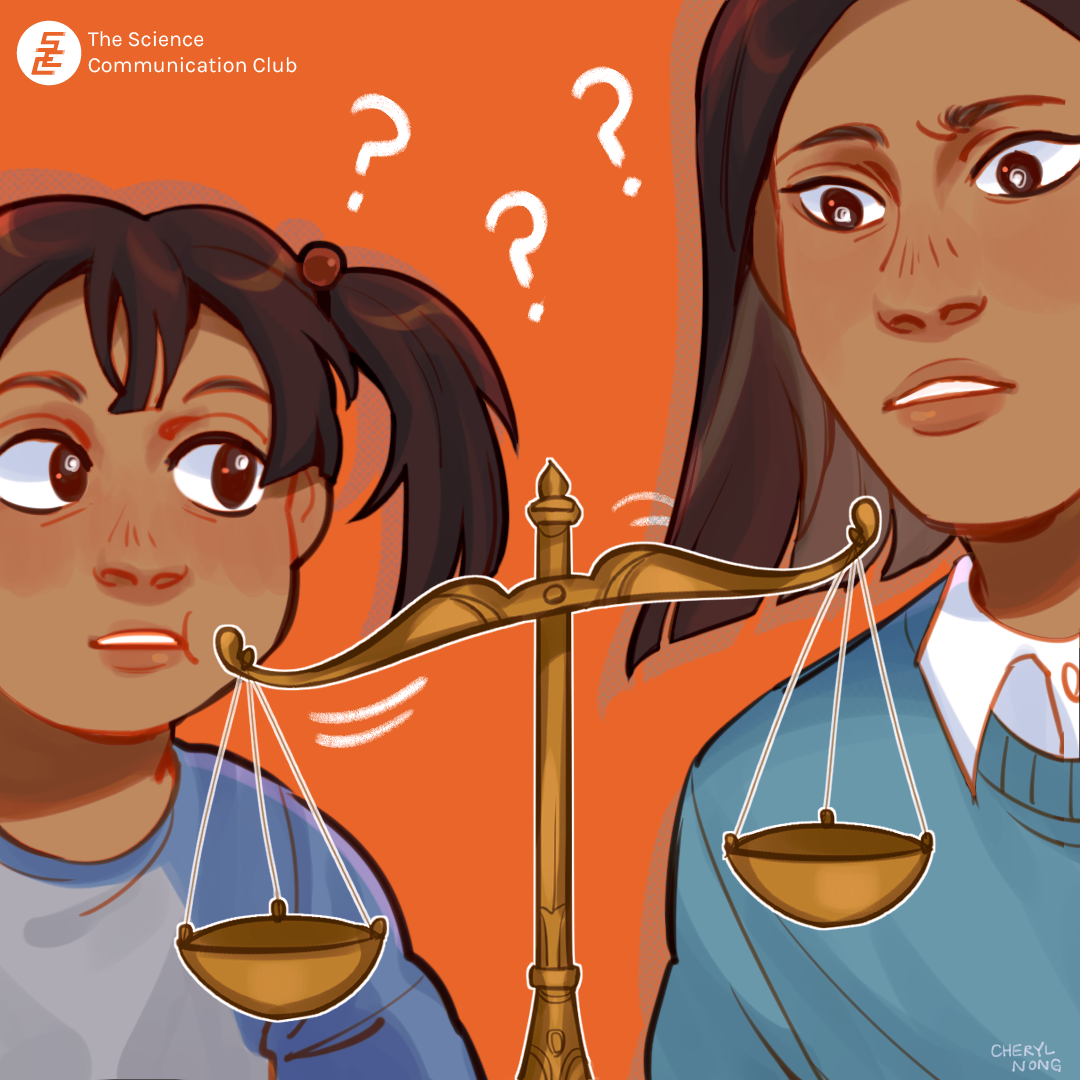
Written by Umang Khan
Illustrated by Cheryl Nong
Let’s start with a thought experiment: Nori made a promise to her friend that she would help her move to a new apartment. However, she then finds out her other friend is having a party at the same time. Now, she isn’t sure–she goes back and forth about whether to keep her promise, or to break it and attend the party instead. Ultimately, she decides to keep her promise and help her friend. Jennifer is faced with the same dilemma (what a coincidence!) but Jennifer sticks to her decision to keep her promise with no thought or hesitation. Who do you think is a morally better person?
If you picked Nori, then you share the same thoughts as philosopher Immanuel Kant. He believed that for an action to be morally good, it should fulfil a duty that is not easily done1.This seems to resonate with adult moral judgments. For example, it has been shown that adults prefer those who reluctantly perform a distasteful but morally good act, because it shows they’ve experienced some inner conflict with it first 2,3.
Now, if you picked Jennifer, you’re thinking like philosopher Aristotle. He argued that an action is only morally good if it is done easily and voluntarily 2. Surprisingly, this also seems to resonate with adults’ moral intuitions in some situations. For example, it has been found that people who perform helpful actions happily are judged more positively than those who perform them grudgingly, even though both people ultimately did the right thing 4,5. Moreover, adults judge a small, good deed (e.g., returning a lost wallet) more positively when it is done quickly rather than slowly6. It seems like adults can show a preference for each intuition, depending on the circumstances.

So, adults can show a preference, but what about kids? A cool thing about developmental psychology (the study of how humans learn and adapt throughout their lives) is that it gives us an idea of how we may have understood these concepts more innately, as a child. It also gives us insight into how our understanding has developed over time. Before we started to experience the world in a more complex way, how might we have thought about inner conflict?
It turns out three- to four-year-old children prefer people who don’t experience any inner conflict at all—whether it comes to performing a morally good action or a morally bad action2. If someone struggles with their decision to cheat in a game versus just cheating in the game with no hesitation, children tend to prefer the latter. In other words, having inner conflict in itself doesn’t seem to vibe with them, even if the conflict is over something wrong.
As adults, we have a lot more ethical and moral decisions to make, and as we grow, our experiences affect our judgments. So, we may show a preference for inner conflict in some contexts and a preference for harmony in others. But at three and four years old? Yeah, not much life experience there. Three- to four-year-old children may just be too young to understand the complexities of temptation and the effort it takes to overcome it.
It seems like that as we grow, we’ve come to appreciate the role that moral inner conflict can play in forming people’s moral characters.
Sources:
1. Kant I, Gregor MJ. Groundwork of the metaphysics of morals. Cambridge, U.K. ; New York: Cambridge University Press; 1998. (Cambridge texts in the history of philosophy).
2. Starmans C, Bloom P. When the Spirit Is Willing, but the Flesh Is Weak: Developmental Differences in Judgments About Inner Moral Conflict. Psychological Science. 2016
3. Mikulincer M, Shaver PR, American Psychological Association. 2012. The social psychology of morality: exploring the causes of good and evil. Washington, D.C.: American Psychological Association.
4. Ames DR, Johar GV. I’ll Know What You’re Like When I See How You Feel: How and When Affective Displays Influence Behavior-Based Impressions. Psychological Science. 2009
5. Krull DS, Seger CR, Silvera DH. Smile when you say that: Effects of willingness on dispositional inferences. Journal of Experimental Social Psychology. 2008
6. Critcher CR, Inbar Y, Pizarro DA. How Quick Decisions Illuminate Moral Character. Social Psychological and Personality Science. 2013